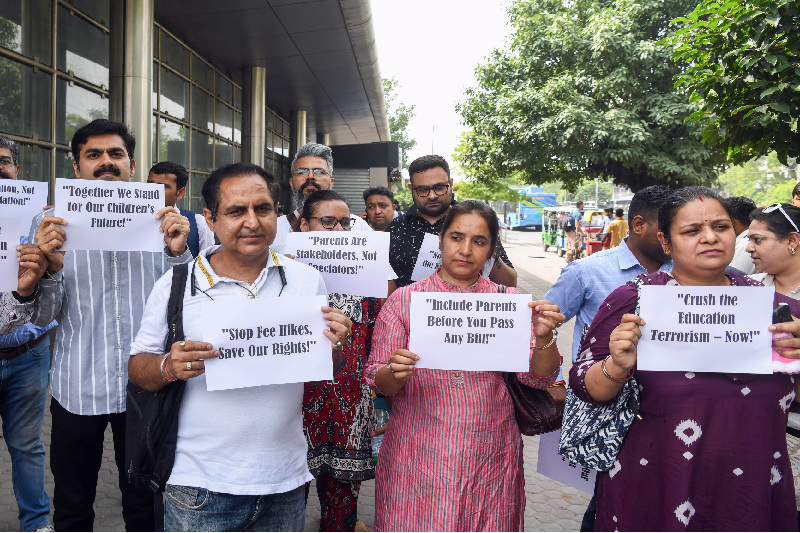
Delhi Government Approves Ordinance to Regulate Private School Fees
The bill aims to protect parents from arbitrary fee hikes; the ordinance awaits the President's assent.
In a move that promises much-needed relief to thousands of parents in the national capital, the Delhi Cabinet, led by Chief Minister Rekha Gupta, has approved an ordinance to regulate the fees charged by private schools. The ordinance is based on the Delhi School Education (Transparency in Fixation and Regulation of Fees) Bill, 2025. It will now be sent to the President of India for assent via the Lieutenant Governor.
Announced by Education Minister Ashish Sood on Tuesday, this decision marks a significant step towards controlling the rising and often arbitrary costs of education in private institutions across Delhi.
A Long-Standing Demand by Parents
During a press conference following the eighth cabinet meeting, Sood emphasized the importance of the ordinance for middle-class families.
“This is a day of happiness for lakhs of parents whose children study in private schools,” he said.
“The ordinance, once approved by the President, will become law and ensure transparency and accountability in fee structures.”
The move is widely viewed as a direct response to long-standing complaints from parents about unregulated fee hikes, hidden charges, and a lack of financial transparency by private schools.
Background: The Push for Reform
The ordinance follows a key cabinet meeting held on April 29, where the Delhi government approved the original bill to introduce a regulatory framework for school fees. This came just weeks after the Education Directorate issued show-cause notices to 10 private schools on April 16 for:
- Arbitrary fee increases
- Failure to submit mandatory financial audit reports
Additionally, the government has reportedly rejected the audit reports of nearly 600 private schools due to discrepancies and non-compliance, signaling an active and ongoing scrutiny of school financial practices.
Supreme Court’s Involvement Adds Legal Weight
Adding a legal dimension to the issue, the Supreme Court of India issued notices on May 29 to the Delhi Directorate of Education (DOE), the Delhi government, and the Action Committee for Unaided Recognised Private Schools in response to a plea challenging a controversial Delhi High Court order.
The HC’s ruling had allowed private schools built on government land to increase tuition fees without obtaining prior approval from the DOE. The plea before the SC argued that:
- Schools had imposed exorbitant fee hikes, in some cases up to 100%.
- Punitive actions were taken against students whose parents failed to pay increased fees.
The matter highlighted not only policy ambiguity but also how some institutions may have overstepped legal and ethical boundaries, often leaving students caught in the crossfire.
The DPS Dwarka Controversy: A Flashpoint Case
A recent incident at Delhi Public School (DPS) Dwarka exemplified the urgent need for fee regulation.
- On May 14, more than 30 students were denied entry to the school campus for non-payment of increased fees.
- This action triggered public protests by parents at the school gates.
- The school had earlier expelled the students “with immediate effect” on May 9, citing applicable rules.
Parents, however, strongly opposed the decision, alleging that the school had flouted a Delhi High Court order from March that prohibited such measures. They also accused the institution of “mishandling children”, claiming that expulsion over fee disputes violated the fundamental right to education.
On June 5, just before the High Court was to pronounce its verdict, DPS Dwarka withdrew its expulsion order, possibly influenced by a prior ruling by a coordinate bench led by Justice Vikas Mahajan.
What the Proposed Law Will Do
Once passed into law, the Delhi School Education (Transparency in Fixation and Regulation of Fees) Ordinance is expected to:
- Mandate audited financial disclosures from private schools
- Prohibit fee hikes without prior approval from the government.
- Introduce a grievance redressal mechanism for parents.
- Establish a regulatory body to monitor school finances.
The law would likely bring Delhi’s education fee regulation in line with other states, such as Maharashtra and Gujarat, where similar frameworks are already in place.
Reactions from the Education Sector
While many parent groups have welcomed the move, some private school associations have expressed concerns. Representatives argue that schools require financial autonomy to maintain quality and infrastructure, especially in the post-pandemic era, where digital upgrades and safety measures have increased operating costs.
However, the government has assured stakeholders that the bill aims not to curb schools’ operational flexibility, but to ensure fairness and accountability.
What’s Next?
The ordinance now awaits the president's assent, after which it will be enacted as law. Once enacted:
- All private and government-aided schools in Delhi will be legally bound to adhere to its regulations.
- Parents will have access to more transparent information regarding fee components and justifications for any increase.
- Schools that fail to comply may face penalties, license cancellation, or legal action.
Conclusion: A Defining Step Toward Equitable Education
With private education costs spiraling and trust between schools and parents eroding, the Delhi government’s ordinance represents a critical intervention. It seeks to restore balance, protect students’ rights, and make the system more equitable and transparent.
Whether this ordinance will survive judicial scrutiny and win widespread compliance remains to be seen. But for now, it marks a progressive step, especially for Delhi's middle-class families seeking quality education without financial strain.



